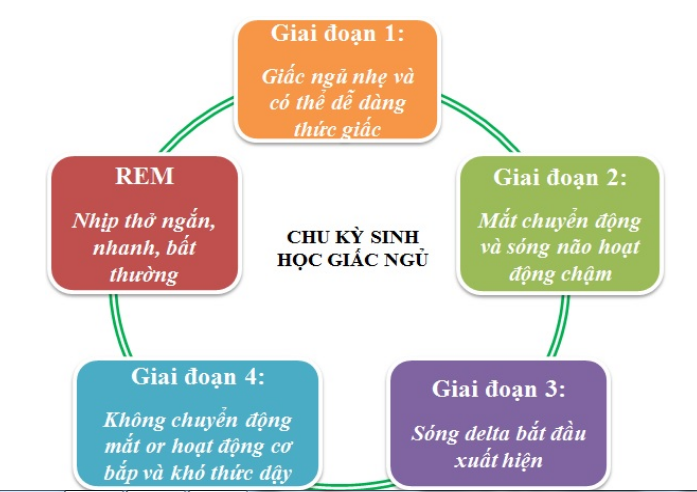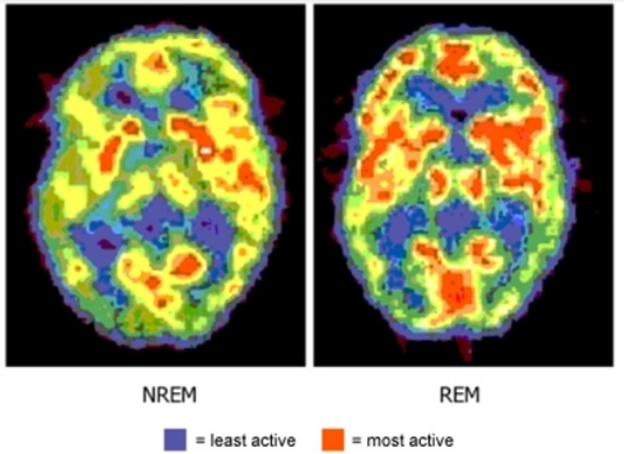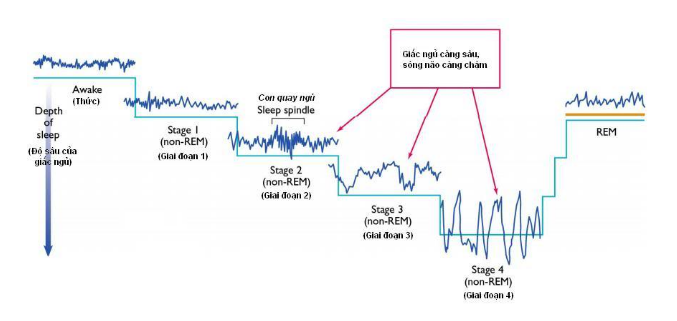Sleep disorders in children
Posted by Doctor Ma Van Tham - Department of Pediatrics - Neonatology - Vinmec Phu Quoc International General Hospital
Sleep has the effect of helping the body recover health and develop. During sleep, the anterior pituitary gland in the brain of children secretes growth hormone. Sleep is especially important for children's brain development. Therefore, sleep disorders in children, if not detected and corrected in time, will greatly affect the physical and mental development of children.
1. What is REM and NREM sleep?
Sleep is a natural physiological need of humans to balance endogenous and exogenous factors. Sleep consists of two parts: REM sleep and non-REM sleep. These 2 cycles will take place continuously and alternately during the time the body is in a sleep state.
REM sleep is also known as "reverse sleep" because although the body is asleep, the brain is very active. positive. During REM sleep, eye movements are very rapid, heart rate and breathing become irregular, sometimes fast, sometimes slow, unpredictable. At this time, people will be in a dream state or in dreams and may appear body movements.

Chu kỳ sinh học của giấc ngủ
Non-REM sleep is the exact opposite of REM sleep when the body is completely in deep sleep. With non-REM sleep, blood pressure, heart rate, breathing rate, and metabolic rate all drop. Meanwhile, the brain waves become very strong and low in frequency. At this point, body movements will not be possible. However, you can still have dreams while in non-REM sleep

Hình ảnh mô phỏng hoạt động của não bộ trong giấc ngủ REM và NREM

Sóng điện não trong các giai đoạn của giấc ngủ
2. The circadian cycle of sleep
On each night, there will be about 4 to 6 alternating REM and non-REM cycles. Each sleep cycle usually lasts about 90-120 minutes. Late at night, REM sleep will become longer and non-REM sleep will become shorter.
Non-REM sleep ie deep sleep can be understood as stage 1, 2, 3 or 4. If in stage 1, 2, non-REM sleep is light sleep then in stage 3, 4, it is deep sleep. Therefore, if you encounter the effects and stimulation before going to bed, you will find it very difficult to fall asleep.
3. Sleep time
Depending on the age and characteristics of the nervous system, each child will have different sleep needs.
Newborns usually sleep 20-22 hours a day, only waking up when hungry and wet. On average, children under 1 year old sleep 16-18 hours per day Children 1-2 years old sleep 14-16 hours per day, Children 2-3 years old sleep 12-14 hours per day, Children 3-6 years old sleep 11-12 hours per day. Day, 7-10 years old children sleep 10 hours a day (in which nap is 1-2 hours).
4. Sleep disorders in children
Sleep disorders occur in 25-43% of children between the ages of 1 and 5, causing many difficulties for the child as well as the family. Sleep problems cause significant emotional, behavioral, and cognitive dysfunction. Sleep disturbances are common in children with neurodevelopmental disorders.
According to the American Psychiatric Association (DSM IV), sleep disorders are classified into 3 categories:
Sleep disorders include:
Primary sleep problems Primary polysleeping narcolepsy Sleep disorders are associated with respiration Sleep disorders related to circadian rhythms Sleep-related disorders:
Nightmares Panic while sleeping Disorders related to mental illnesses

Rối loạn giấc ngủ ở trẻ em khiến trẻ hoảng hốt khi ngủ
5. Favorable factors of sleep disorders
Favorable factors of sleep disorders include: Body fatigue; Having a physical illness; Psychological stress causes mental stress
Children can have sleep disturbances in many different ways such as: short sleep apnea with snoring, muscle twitching during sleep, excessive daytime sleep, periodic limb movements, narcolepsy, insomnia, night terrors...
Among them, narcolepsy and sleep panic attacks, trouble sleeping, and narcolepsy are quite common.
In addition, in order to prevent diseases that young children often get, parents should pay attention to nutrition to improve children's resistance. At the same time, add supporting foods containing lysine, essential micro-minerals and vitamins such as zinc, chromium, selenium, B vitamins,... snacks and less digestive problems.
Parents can learn more:
Why do you need to supplement Lysine for your baby?
The role of zinc - Guidelines for reasonable zinc supplementation
Please visit the website Vinmec.com regularly and update useful information to take care of your baby and family.
Bài viết này được viết cho người đọc tại Sài Gòn, Hà Nội, Hồ Chí Minh, Phú Quốc, Nha Trang, Hạ Long, Hải Phòng, Đà Nẵng.





